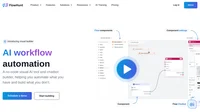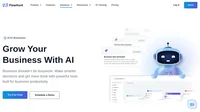What is an AI-Driven Startup?
An AI-driven startup is a business that centers its operations, products, or services around artificial intelligence technologies. These startups leverage AI to develop innovative solutions, automate processes, and derive insights from data to gain a competitive edge in their respective industries. Unlike traditional startups, AI-driven startups make AI integral to their value proposition, often resulting in transformative impacts on their business models and market strategies.
Example of AI driven startup is also Flowhunt – the project, where you are reading this glossary 🙂
If you are looking for such startups, lets get in contact.
Detailed Insights
AI startups are companies that use AI to create products or services that solve complex problems or enhance efficiency. These businesses go beyond traditional software development by focusing on technologies that enable machines to learn, adapt, and make decisions, mimicking human capabilities in areas such as language processing, image recognition, and decision-making. Notable examples include OpenAI and DeepMind, which are advancing AI applications in language processing and healthcare, respectively.
Main Focus of AI-Driven Startups
AI-driven startups focus on integrating AI into their core operations to achieve several key objectives:
- Scale: AI technologies enable startups to handle increasing amounts of data and operations without a proportional increase in cost, allowing them to scale efficiently. AI allows businesses to manage growth by automating processes and enhancing productivity, which is crucial in sectors like e-commerce and finance.
- Automation: By automating routine and complex tasks, AI-driven startups can reduce manual effort, minimize errors, and enhance productivity. This can include automation in customer service, data analysis, and process optimization. Automation is particularly valuable in industries such as logistics and healthcare, where it improves efficiency and reduces operational costs.
- AI Model Training: Developing and refining AI models is critical for these startups. This involves training machine learning models on large datasets to improve their accuracy and predictive capabilities. AI startups invest significantly in research and development to create robust AI models that can forecast trends, customer behavior, and market dynamics.
Examples and Use Cases
- Healthcare: Startups like Zebra Medical Vision use AI to analyze medical imagery, aiding in accurate diagnosis and treatment planning. AI helps in detecting diseases early, improving patient outcomes, and reducing healthcare costs.
- Finance: Companies such as Kensho Technologies employ AI to analyze financial data, providing actionable insights for investment decisions. AI-driven fintech solutions enhance fraud detection, credit scoring, and risk management.
- Retail: AI startups like Syte.ai utilize computer vision to enhance shopping experiences by providing personalized product recommendations. AI assists in inventory management, customer service, and pricing strategies.
Keywords and Concepts
1. Artificial Intelligence (AI)
AI refers to the simulation of human intelligence processes by machines, especially computer systems. It includes learning, reasoning, and self-correction. AI’s versatility allows it to be applied across different sectors, driving innovation and efficiency.
2. Competitive Advantage
AI-driven startups often gain a competitive advantage by utilizing AI to innovate, reduce costs, and enhance customer experiences, allowing them to outperform traditional competitors. This advantage is often sustained through continuous improvement and adaptation to market changes.
3. Natural Language Processing (NLP)
NLP is a subfield of AI that focuses on the interaction between computers and humans through natural language. It is used in applications like chatbots and sentiment analysis. Startups like Grammarly and DialogueFlow are leaders in NLP, transforming communication technologies.
4. Predictive Analytics
This involves using historical data and AI algorithms to predict future outcomes. It is widely used in AI-driven startups for market forecasting and customer behavior analysis. Predictive analytics helps businesses make informed decisions, optimize operations, and enhance customer engagement.
5. Operational Efficiency
AI-driven startups achieve operational efficiency by automating repetitive tasks and optimizing business processes, leading to reduced costs and increased productivity. Efficiency gains are crucial in logistics, manufacturing, and service industries.
6. Customer Experiences
AI enhances customer experiences by providing personalized recommendations, automating support services, and improving response times. AI-driven personalization leads to higher customer satisfaction and loyalty.
7. Machine Learning Algorithms
These are algorithms that allow computers to learn from and make predictions or decisions based on data. They are pivotal in developing AI models for startups. Machine learning is fundamental to AI, enabling applications in various domains from healthcare to finance.
8. Ethical Considerations
AI-driven startups must consider ethical implications, such as data privacy and algorithmic bias, to ensure responsible AI deployment. Ethical AI practices build trust with consumers and comply with regulations like GDPR.
Strategic Importance of AI for Startups
- Data-Driven Decisions: AI-driven startups harness data analytics to inform strategic decisions, from product development to market entry strategies. Data-driven insights enable more accurate forecasting and strategic planning.
- Innovation and Growth: AI provides startups with the tools to innovate rapidly, allowing them to tap into new markets and customer segments. AI-driven innovation leads to the development of new products, services, and business models.
- Partnerships and Collaborations: Collaborating with other technology firms or research institutions can enhance AI capabilities and market reach. Partnerships can provide access to advanced technologies, expertise, and new customer bases.
Challenges Faced by AI-Driven Startups
- Data Privacy and Security: Ensuring compliance with regulations like GDPR is essential for maintaining trust and avoiding legal issues. Data protection is crucial as startups handle sensitive information.
- Talent Acquisition: Finding skilled AI professionals can be challenging due to high demand and competition from established firms. Startups need to offer competitive packages and a compelling mission to attract top talent.
- Scalability: While AI facilitates scalability, startups must also ensure that their AI models and infrastructure can handle growth effectively. Scalability challenges involve technical, operational, and financial considerations.
Generative pre-trained transformer (GPT)
Discover how GPT revolutionizes text generation with AI, enhancing content creation, chatbots, and more. Explore its workings and applications!



